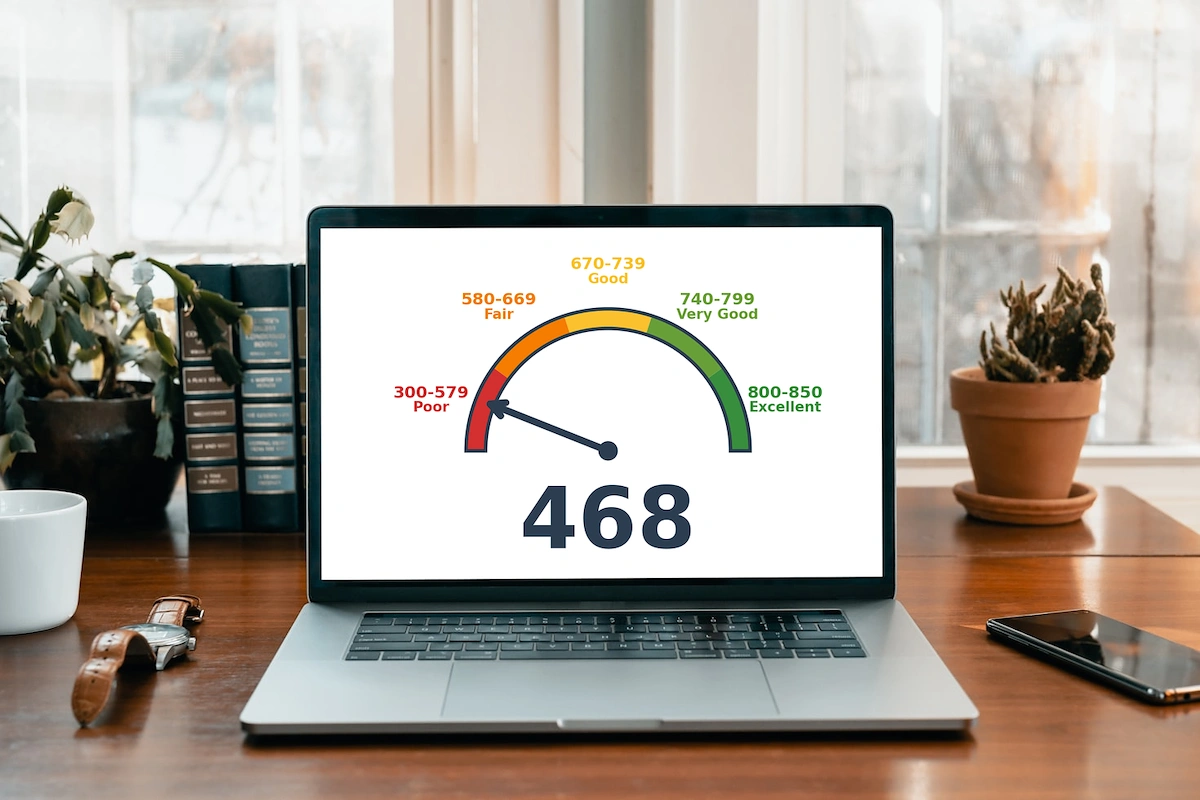
Kudos has partnered with CardRatings and Red Ventures for our coverage of credit card products. Kudos, CardRatings, and Red Ventures may receive a commission from card issuers. Kudos may receive commission from card issuers. Some of the card offers that appear on Kudos are from advertisers and may impact how and where card products appear on the site. Kudos tries to include as many card companies and offers as we are aware of, including offers from issuers that don't pay us, but we may not cover all card companies or all available card offers. You don't have to use our links, but we're grateful when you do!
468 Credit score: What You Need to Know in 2026
July 1, 2025


TL;DR
A 468 credit score offers a clear opportunity for growth, setting the stage for impactful financial improvements. This score falls into the “Poor” FICO category, signaling a foundational starting point from which to build a stronger credit history.
What Does a 468 Credit Score Mean?
A credit score of 468 falls squarely into the "poor" category on the FICO scale, which ranges from 300 to 850. Lenders view this score as a sign of high risk, which can significantly impact your financial life. You'll likely face rejections for new credit cards and loans, and any approved credit will probably come with steep interest rates and unfavorable terms.
While this score presents considerable challenges, it's not a permanent state. It reflects past credit difficulties but also serves as a baseline for rebuilding. Understanding your current standing is the crucial first step toward improving your credit health. Over time, it's possible to build a stronger credit history and move into higher score ranges, unlocking better financial opportunities in the future.
Who Has a 468 Credit Score?
While age isn't a direct factor in calculating your credit score, there is a clear trend of scores improving over time. According to Experian data from the third quarter of 2023, here are the average FICO scores by generation:
- Generation Z (ages 18-26): 680
- Millennials (ages 27-42): 690
- Generation X (ages 43-58): 709
- Baby Boomers (ages 59-77): 745
- The Silent Generation (ages 78+): 760
Credit Cards With a 468 Credit Score
A credit score of 468 falls into the "very poor" range, which can significantly hinder your ability to obtain a credit card. Lenders view this score as a high-risk indicator, making it challenging to get approved for most conventional, unsecured cards. Consequently, your options will likely be restricted to secured credit cards that require a cash deposit or specific subprime cards that come with high fees and interest rates.
Kudos can help you find the best credit card for your financial situation through its AI-powered tools, which provide personalized recommendations based on your spending habits and financial goals. These tools offer insights into how a new card might affect your credit score, empowering you to make an informed decision and build credit responsibly.
Auto Loans and a 468 Credit Score
A 468 credit score places you in the deep subprime category, which can make securing an auto loan difficult, though not impossible. If you are approved, you can expect to face some of the highest interest rates offered by lenders.
According to a 2025 auto loan analysis, average interest rates vary significantly across credit score brackets:
- Super-prime (781-850): 5.25% for new cars, 7.13% for used cars
- Prime (661-780): 6.87% for new cars, 9.36% for used cars
- Non-prime (601-660): 9.83% for new cars, 13.92% for used cars
- Subprime (501-600): 13.18% for new cars, 18.86% for used cars
- Deep subprime (300-500): 15.77% for new cars, 21.55% for used cars
Mortgages at a 468 Credit Score
A 468 credit score is considered very poor, placing you below the minimum threshold for almost all conventional and government-backed mortgages. According to mortgage requirements, even the most lenient FHA loans require a score of at least 500 with a 10% down payment. As a result, your options are extremely limited and fall outside traditional lending, possibly requiring you to explore rare subprime lenders or alternative financing.
Even if you find a lender willing to work with you, a score this low heavily impacts loan terms. You would face substantially higher interest rates and costly mortgage insurance premiums. Lenders would also cap the amount you can borrow and subject your application to strict manual underwriting, scrutinizing your entire financial history, income stability, and cash reserves to offset the risk.
What's in a Credit Score?
Understanding your credit score can feel like trying to solve a complex puzzle, as it's a blend of several key financial habits. The most common factors that determine your score include:
- Your payment history tracks whether you have paid past credit accounts on time.
- Credit utilization is the percentage of your available credit that you are currently using.
- The length of your credit history considers the age of your oldest account and the average age of all your accounts.
- Credit mix refers to the variety of credit products you have, such as credit cards, retail accounts, and loans.
- New credit inquiries and recently opened accounts can also temporarily impact your score.
How to Improve Your 468 Credit Score
Having a 468 credit score can be challenging, but it is entirely possible to improve your credit health with consistent, positive financial habits. By implementing a few proven methods, you can begin to rebuild your score, often seeing meaningful changes within three to six months.
- Establish automatic bill payments. Your payment history is the most significant factor in your credit score, and a 468 score likely indicates past missed payments. Setting up automatic payments is the surest way to ensure you pay on time, every time, which is the most critical step to rebuilding your credit.
- Reduce your credit utilization ratio. This ratio compares your credit card balances to your total credit limits, and keeping it low is crucial. For a low score, aiming to keep utilization below 30% shows lenders you can manage credit responsibly and aren't over-reliant on debt.
- Monitor your credit reports. Regularly check your reports from Experian, TransUnion, and Equifax for errors or signs of fraud. Disputing and removing inaccuracies can provide a direct boost to a very poor score that may be held down by incorrect negative information.
- Apply for a secured credit card. It can be difficult to get approved for traditional credit with a 468 score, making a secured card an excellent rebuilding tool. Since it's backed by your own cash deposit, it's easier to obtain and allows you to build a positive payment history with responsible use.
To help manage your cards and make smarter spending decisions on your credit improvement journey, consider using the free AI-powered browser extension from Kudos.
Unlock your extra benefits when you become a Kudos member

Turn your online shopping into even more rewards

Join over 400,000 members simplifying their finances

Editorial Disclosure: Opinions expressed here are those of Kudos alone, not those of any bank, credit card issuer, hotel, airline, or other entity. This content has not been reviewed, approved or otherwise endorsed by any of the entities included within the post.



































.webp)







